How to Develop a Football Team Management App? Pro Developer Shares Best Tips
It is hard to find a person who does not remember Simone Biles' shocking (as always) performance at the 2024 Olympics in Paris. Three golden medals, one silver, and millions of fans cheering Simone online and on the rostrums. But have you thought of how many hours of exhausting work and tons of discipline are behind her glory? What does it take to bring your brightest player to victory in the era of the fastest tech progress ever? Yes, today we are going to talk about sports league management software, and how to build the solution that will not just gather teams but drive their motivation and dedication. In this article, we have gathered the top insights on football team management app development by our top-tier web developer, Mykhailo Fedorovych, in an all-in-one pro development guide. Find the most frequently asked questions answered by our expert, the secrets of streamlined solution building revealed, and must-have sports management software features explained. Let the game begin!
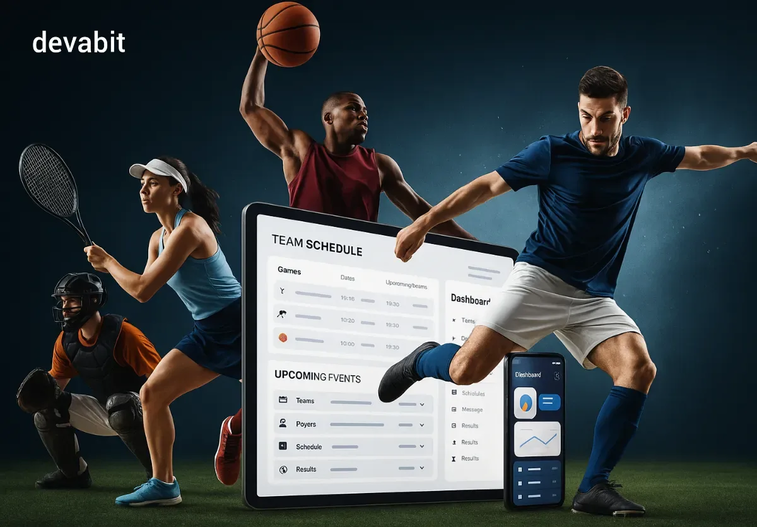
- Sports League Management Software: From A to Z
- Is Sports League Management Software Worth the Investment?
- How to Develop a Football Team Management App? Step-by-Step Guide by devabit Developer
- Q1 How did everything start? Did you conduct the market research?
- Q2 What tech stack did you use and why?
- Q3 What unique features does the platform include?
- Q4 What APIs have you integrated?
- Q5 How do you handle real-time communication and notifications?
- Q6 How long did it take to develop the solution?
- Q7 How did you ensure the platform is scalable and multi-tenant?
- Q8 What can you say about the UI?
- Q9 How do you handle security in the solution?
- Q10 How would you describe the whole building process step-by-step?
- Mykhailo Answers FAQs about Sports Team Management Software Building
- What features should a football team management app include?
- How do I design the user interface for a football management app?
- What tech stack is best for building a sports team management app?
- Should I build a native app or a web app for football team management?
- How can I include performance tracking and analytics?
- What backend/database should I use to store team and player data?
- How do I implement user roles (e.g., coach, player, admin)?
- How can I monetize a football team management app?
- Are there existing APIs for football stats I can integrate?
- How can I enable push notifications for schedule changes or team updates?
- What are the best practices for UX in a sports management app?
- How long does it take to develop such an app?
- Should I use Firebase for real-time updates and chat?
- What are some successful examples of football management apps?
- How much does it cost to build and maintain a football team management app?
- Football Team Management App: Finishing Touches
Sports League Management Software: From A to Z
Before falling for a detailed overview of a sports league management software structure, we should go back to the basics and have a clear understanding of what a sports team management app is actually about.
What Is a Football Team Management App?
A football team management app or a sports league management platform is an all-in-one digital solution designed to help coaches, players, and potentially their parents effectively manage team players, arrange training sessions, provide an efficient communication channel among team members, and track critical metrics.
The key functionality of a sports league management software lies in its ability to combine all the management tools in one well-packed place. The sports team management tool is usually delivered via a mobile application, web platform, or a cross-platform solution.
Football team management applications are being used by pro and amateur sports leagues worldwide to ensure transparent communication among team members and increase the overall level of training organization.
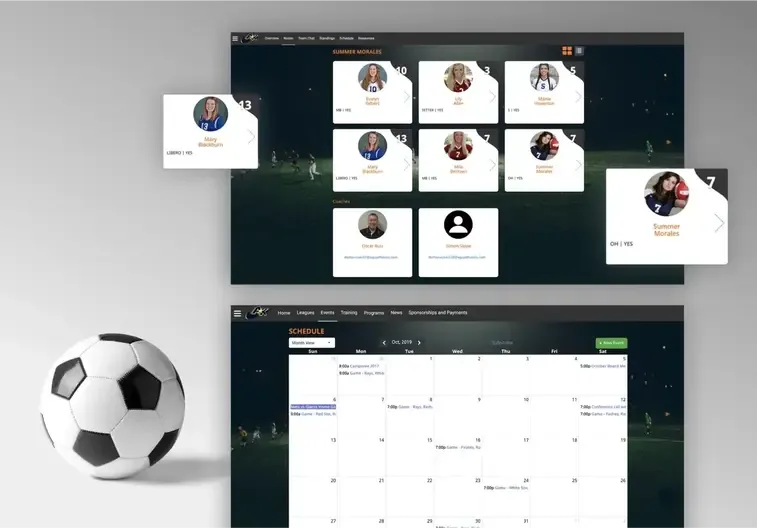
What are the Must-Have Features of Sports Management Software?
When talking about robust sports league management software, we must consider several must-have features that will contribute to an unmatched user experience, foster audience loyalty, and ensure the solution's safety. And these features usually include:
- Several user roles, like admin, coach, player, parent, etc;
- Scheduling tool, additionally synced with calendar and push-notifications;
- Real-time communication tool for ensuring effective and secure contact between the users;
- Player management tools like customizable metrics, performance and attendance tracking, or medical info;
- Scorekeeping and analytics for ensuring a complete understanding of players' data;
- Payment gateway for providing several subscription plans and paid memberships;
- Customization to make your sports league management software compatible with any sports type, as well as other activities such as music schools, hobby groups, commercial organizations, and more.
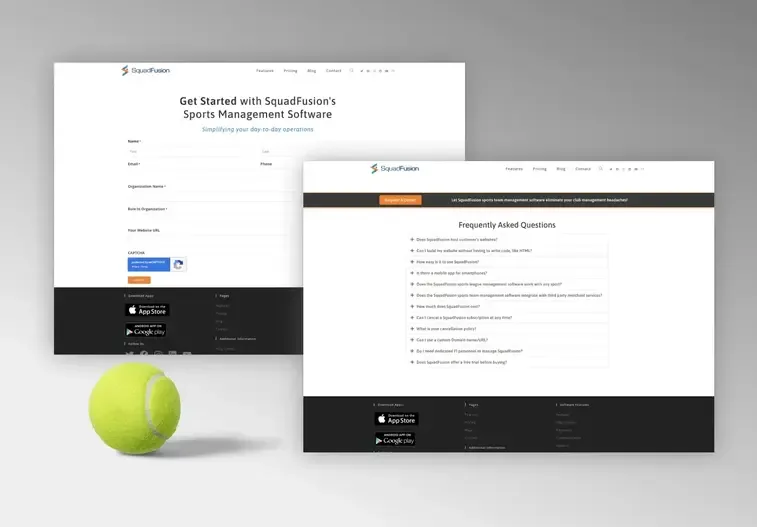
Though if you want your solution to deliver higher value and reach a wider audience, consider incorporating such advanced or unique features as:
- AI-Driven Analytics;
- Multi-Language Support;
- Offline Mode;
- Video/Audio Integration;
- Parent/Guardian Profiles;
- Wearable Integrations;
- Automated Reporting.
Sports Management Platform Development Cost
Probably the first aspect we consider when planning a sports league management software development is the budget. And a full-featured sports application or an all-in-one platform is the case when the price range can impress. Let's get into why:
- Feature Set: the sports league management software is an endless landscape for incorporating unique features, but it is also an almost infinite space for investments. API integrations, innovative UI design, real-time communications, and best-in-class payment gateways — these are definitely at the top of your expense list.
- Platform Choice: an internal debate on whether to choose a robust mobile application, a responsive web platform, or a unified solution. Sometimes it is not the question about your preferences but about your budget.
- Team Size & Location: even though software development outsourcing remains its leadership positions on the most cost-effective solutions on the market, we always must consider the destination, niche, and number of experts we choose to involve.
- Post-Launch Support: a common misconception that the work is done once the solution hits the market has destroyed not one project. When forming your budget, always remember about the ongoing support and necessary updates so that your solution stays secure, up-to-date, and keeps up with your users' demands.
- Tech Stack Choice: when choosing scalable and demandable tools, you should be ready for further investment into their maintenance and optimization. If you want to avoid costly choices on your way to the bespoke product, it is better to invest in trusted software engineering consulting services and have an expert look.
Okay, it seems like we are done with our budget ambitions, but how do you know if sports league management software development is worth the investment in 2025? Let's delve into it!
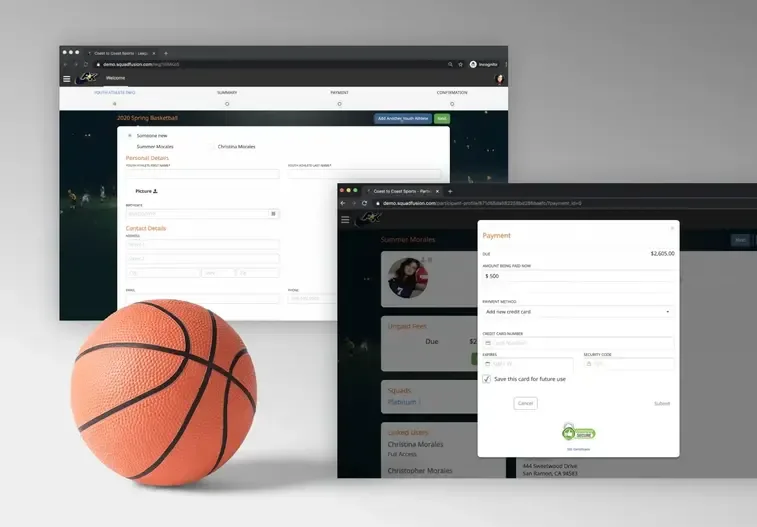
Is Sports League Management Software Worth the Investment?
The new generation of football and tennis stars is growing up to replace the sportspeople who are not even half close to their career peak. But that is sport, the eternal hobby, profession, and fun time out that will probably never leave humanity alone. No matter how hard the tech progress will hit, people will still choose to hit pucks and balls, but now with innovation instead of spare on the court.
The question about the relevance of sports league management software building is not about "yes" or "no". It is about "how?"
With the growing digital expectations of teams, players, and fans, and increasing operational complexity at all levels of sports, the demand for streamlined, tech-driven solutions is only accelerating. And that can be your one-in-a-million chance to rock the industry.
Even though AI and digitalization have already spread to almost every sphere of our lives, sportspeople still tend to rely on outdated systems or even old-fashioned, poor communication. And that is not about old-school coaches or players refusing to spend their time online, but about the solutions that do not solve the real problems and demands. Sometimes they stand only as an additional time-consumer. You do not want your sports league management software to be like that, do you?
In taking stock, the football team management app is worth every dollar of investment if you aim to solve real issues and meet the demands of the real audience.
How to Develop a Football Team Management App? Step-by-Step Guide by devabit Developer
And here it comes! Everything you need to know about sports league management software building, all gathered together by our top-tier developer, Mykhailo Fedorovych. Continue reading to find the answers to all your questions.
Below, we have prepared an all-in-one guide on how to develop a football team management platform that is used by 250+ organizations in the format of a Q&A session with Mykhailo to give you simple answers to complex questions. Let's get started!
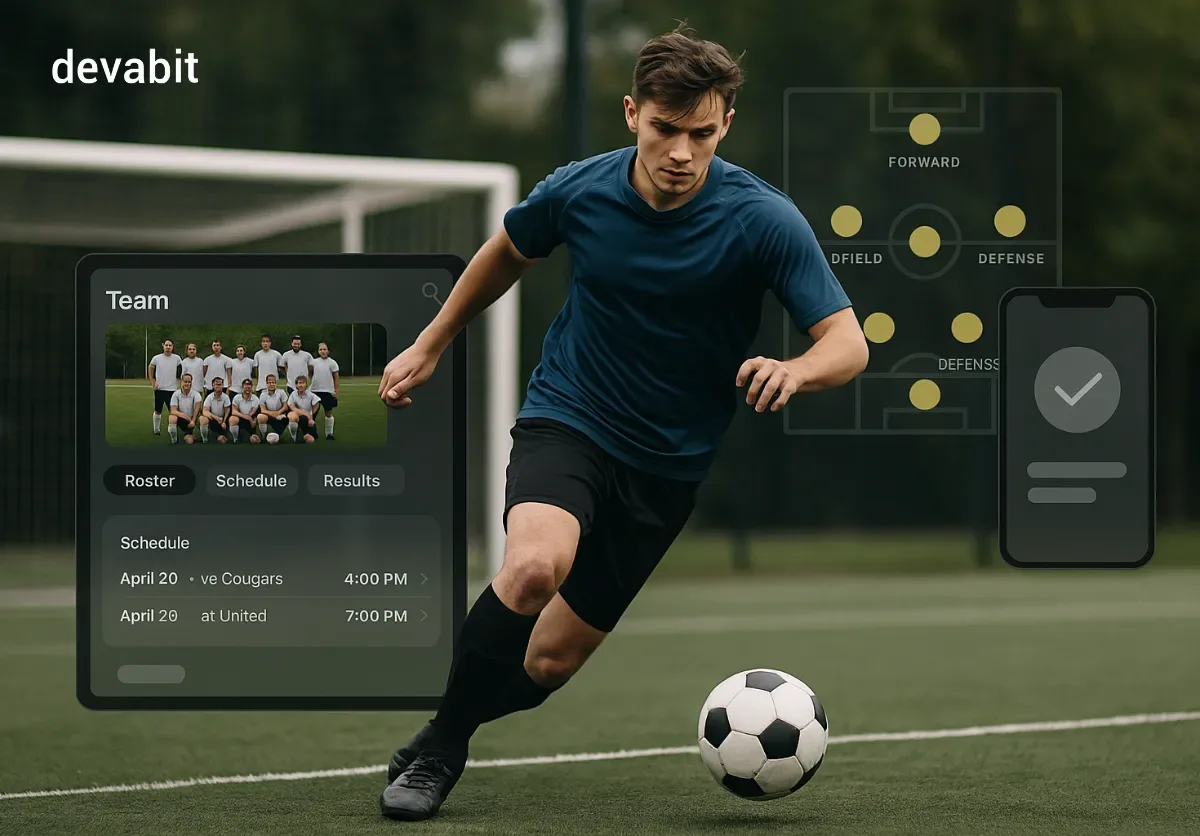
Q1 How did everything start? Did you conduct the market research?
Yes, we began with in-depth market research. We have studied existing platforms, interviewed coaches and admins from different sports clubs, and identified common pain points, which include manual scheduling, inconsistent communication, and payment chaos. That helped us design features users actually needed, not just nice-to-haves. And from that point, the long coding has hit.
Q2 What tech stack did you use and why?
For the SquadFusion, we decided to choose React.js for the frontend for speed and modularity, and paired it with Node.js and Laravel on the backend. For real-time capabilities, we integrated Firebase, and used PostgreSQL for structured, relational data. We also relied on Moment.js and Luxon for time zone management, and Froala as our WYSIWYG content editor.
Q3 What unique features does the platform include?
For this sports league management app, we chose to truly go beyond basics, and here are a few examples:
- Custom branding per organization (logos, fonts, terminology), which now enables the client to sell the platform to even non-sport organizations;
- Sub-profile support for managing young participants;
- Role-based dashboards;
- Several flexible subscription models;
- Real-time chat and push notifications;
- Dynamic, customizable registration forms;
- Easy-to-use and memorable UI design;
- Calendar sync and offline performance.
Q4 What APIs have you integrated?
With SquadFusion, we decided not to fall for building specific tools from scratch but chose existing trusted APIs, which allowed us to streamline the workflow and save the client's costs. And these include:
- Stripe, PayPal, and Bambora for payments;
- Firebase Cloud Messaging and OneSignal for notifications;
- FullCalendar for scheduling;
- Froala Editor for editable content areas;
- Internal REST APIs for event, booking, and reporting logic.
Q5 How do you handle real-time communication and notifications?
We implemented WebSockets for real-time chat and fallback polling for legacy support. For notifications, we use Firebase Cloud Messaging and OneSignal as an optional add-on. Notifications are role-aware; parents, coaches, and players all get relevant alerts only.
Q6: How long did it take to develop the solution?
The MVP took around 4.5 months with a small team. We focused first on scheduling, user management, and payments. The full-featured platform you see now took about 10 – 12 months, including time for testing, integrations, and performance optimization. We're still continuously updating and maintaining it.

Q7: How did you ensure the platform is scalable and multi-tenant?
The SquadFusion's backend is structured as a multi-tenant system using organization IDs for data isolation. We used PostgreSQL for relational data and Firebase for real-time interactions where needed. Each club instance can be branded and managed independently through an admin superlayer.
Q8 What can you say about the UI?
It’s highly customizable. And it was our #1 priority. Each organization can control the branding: fonts, colors, button labels, and even role names. The design is clean and mobile-first, ensuring great usability even for non-technical users. We also use personalization logic so dashboards show only what's relevant to each role.
Q9 How do you handle security in the solution?
Security is built in at multiple layers. We use HTTPS for all traffic, secure authentication tokens, role-based access control on both frontend and backend, and validation for all user input. Sensitive operations are logged, and we use Firebase and third-party tools for anomaly detection. We also implemented access rules per organization to isolate data.
Q10 How would you describe the whole building process step-by-step?
- Discovery Phase: market research, competitor analysis, and user interviews;
- Planning & Design: wireframes, architecture planning, and UI/UX prototyping;
- MVP Build: core features like scheduling, login, and registration;
- Backend & APIs: modular services for booking, payments, and reporting;
- Frontend Integration: calendar, dashboards, chat UI, admin panel;
- Testing & QA: manual testing, bug tracking, performance profiling; Launch & Feedback: deployment, usage monitoring, early feedback loop;
- Scale & Improve: optimization and feature expansions;
And that was Mykhailo Fedorovych, the real magician in world development! But it seems like we still have a few questions left ;)
Mykhailo Answers FAQs about Sports Team Management Software Building
In this part, our leading developer, Mykhailo Fedorovych, has prepared detailed answers to the most frequently asked questions to help you find out more about the future-proof sports team management software building. Without further ado, let's get started!
What features should a football team management app include?
In order to equip a robust football team management app, your solution should include such core features as:
- User Profiles: admin, player, parent (if the app is considered for a young audience use);
- Squad Lists & Roles: e.g., first-team, reserves, captain, etc;
- Calendar & Scheduling Tool: push-notifications and reminders, drill library, training sessions, time, location booking;
- Real-Time Communication Options: group and personal chats, push-notifications, and announcements;
- Player Data: customizable metrics required for the specific coach, like player height, foot size, age, team position, etc;
- Memberships & Payment Gateways: several subscription plans with payment API integrated, record payment history, automated reminders, and overdue payments;
- Performance Analytics: minutes played, matches, goals, IoT (Internet of Things) integration for importing and analyzing health data, injury risk monitoring;
- Third-Party Integrations: Calendar Sync, Social Media Auto-Post, Payment Gateways, etc;
- Web & Mobile Versatility;
These are the must-have features to include in your sports league management software, but for creating a unique user experience, Mykhailo also recommends adding advanced features like:
- AI-Driven Analytics: e.g., for analyzing team progress during the season;
- Language & Currency Localization: for reaching a global audience;
- Multi-Sport Compatibility: for meeting the demands of a diverse audience;
- Customizable Team Goals: for creating a tailored user experience;
"Our SquadFusion solution is all about customization. Customizable everything from color theme and player profiles to event page, and language settings. A tailored approach is something that has helped our client sell their football team management app already to over 250 different sports teams seeking smart management." — Mykhailo about what makes our sports league management software so profitable.
How do I design the user interface for a football management app?
When building sports league management software, you should prioritize a clean, responsive, and functional user interface. Here is a step-by-step guide on how to design and integrate UI for a football team management app:
- Identify Primary Users: admin, player, coach, parent (for teen/child teams), and other customizable options.
- Outline Key Tasks & Features: for each profile type, you need to identify core functions and relevant UI elements.
- Use Figma for Creating Wireframes: the perfect all-in-one platform for designing UI elements using ready-to-go samples or custom visuals for both web and mobile layouts.
- Use HTML & Bootstrap to create the layout of your web sports league management software.
- Use Swift or Xcode for building an iOS and Android football team management app.
- Add Interactivity with JavaScript: to handle form submissions, update player availability, and display real-time match statistics.
- Figma Testing: return to Figma to test your newly-integrated UI features and iterate based on gathered feedback.
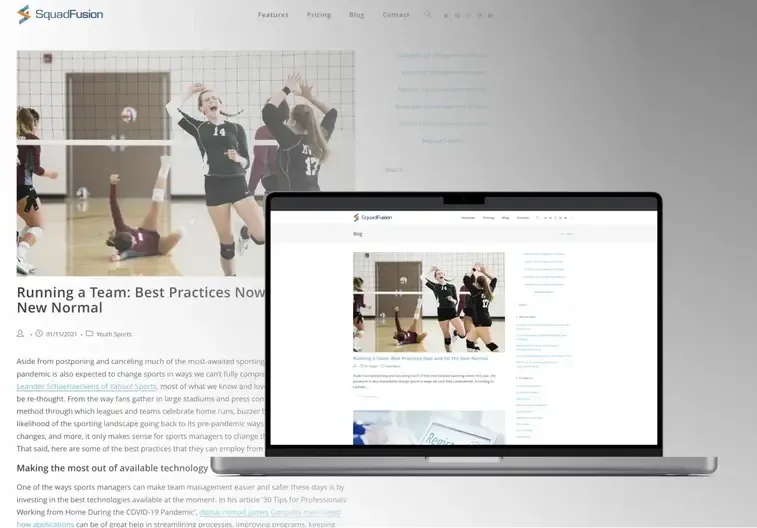
What tech stack is best for building a sports team management app?
For a web-based sports team management app, we recommend utilizing an easy-to-maintain and scalable tech stack, like:
- Frontend: JavaScript, HTML, CSS, React.js, Vue.js, Angular, Bootstrap, Figma, Chart.js;
- Backend: Node.js, Express.js, Socket.IO, MongoDB, PostgreSQL, J WT;
- Deployment & Hosting: Amazon Web Services (AWS), Docker.
For a mobile football team management app development, our developer recommends choosing a cross-platform tech stack like:
- Frontend: React Native, Expo, Redux, Flutter, Xamarin;
- Backend: Node.js + Express.js, Firebase, GraphQL;
If you want your sports league management software to be compatible with both web and mobile versions, it is better to choose tools like:
- React Native + React;
- Flutter;
- Ionic.
Should I build a native app or a web app for football team management?
The decision to invest in developing a native football team management app or a web sports league management software depends on several crucial factors like your budget and timeline ambitions, the target audience you aim to reach, feature requirements, and others, but let's have a quick overview of the main pros and cons to help you have a thorough understanding of your next moves:
Native App (iOS & Android):
- Performance & Device Versatility: when building a football team management app, we prioritize compliance with diverse device and system types, which allows us to reach a wider audience, whether they use their iPhone 11 or a family tablet. However, the creation of a sports league management software that will deliver flawless performance across several devices may require more specific and complex expertise.
- Advanced Featuring: another huge advantage of a mobile sports management app lies in its extensive feature potential. From real-time chats and push-notifications to camera integrations and biometric authentication. The only limits are your imagination and budget.
- User Experience/Interface: not to mention that a mobile sports league management platform is an endless landscape for building an unmatched user experience. Investing in a unique design with the user in mind is your chance to stand out among the competitors and conquer the audience's loyalty.
- Higher Development Cost & Time: building the mobile football team management app means choosing a long-term investment over short-term success. If you want your mobile sports league management software to truly stand out, you must cooperate with trusted mobile developers and be prepared for a long ride on the way to the result.
Web Platform:
- Easier to Maintain, Build, and Discover: despite the fact that a web sports league management software may not always surprise with shocking features or offline performance, we must admit that the web solution will take significantly less time and resources to build, while it may appear easier for the potential users to discover it via natural SEO-optimization. As a bonus, a web football team management app is usually built on a light-weight and easy-to-scale tech stack that is ready for ongoing updates and modernization.
- Lower Development Cost & Time: if you rely on a limited budget and timelines, a web sports league management software is your perfect choice, as launching an MVP or basic web platform may be twice as cheap and fast compared to a mobile one.
- No Installation Barrier: instant access via browser eliminates the need for installing your sports league management software, helping your users reach the service they need without wasting a single megabyte of their device storage.
- Offline Limitations: meanwhile, your web football team management app is easy to discover and reach, you can lose the loyalty of users who prefer offline access.
In taking stock, a mobile football team management app is a time-consuming solution that requires intense investment and will significantly pay off and help you attract a wider audience. At the same time, a web sports league management software is an excellent choice if you want to validate your concept via MVP or operate on a limited budget.

How can I include performance tracking and analytics?
A user-centered sports league management software always ensures the audience is provided with advanced analytics and intuitive performance tracking, and here is how you can bring it to your solution:
- Define what analytics and metrics to track. These can be attendance rates, matches, or time played, injuries or medical stories, goals, and player ratings.
- Plan your data structure. This can be easily done via Firebase. Build the editable input interface for all user roles, like coach, player, admin, parent, etc.
- Visualize the data via Chart.js, Recharts, Victory Native, or D3.js. Enable analytics and reports for your users.
- Manage access and privacy for those who can and cannot edit the metrics input.
What backend/database should I use to store team and player data?
Among the best secure backend/database options for your football team management app building, we recommend:
- Firebase (Firestore + Firebase Auth): best for MVPs, mobile apps, ongoing updates;
- Supabase: best for SQL-based applications and real-time support;
- Node.js + PostgreSQL/MongoDB: best for custom APIs and full-featured apps;
- AWS Amplify: best for enterprise-grade solutions;
- Hasura + PostgreSQL: best for GraphQL-first architecture.
How do I implement user roles (e.g., coach, player, admin)?
Defying key user roles is the groundwork of a thought-out sports league management software, and here is how you can make it in the most effective way:
- Define the roles and permission levels, like admin, coach, player, parent (for young audience), etc.
- Create a database structure on a backend or Role Per Team.
- Assign roles on signup or invite. Apply role-based access on your backend database.
- Adjust the UI on your frontend.
- Manage the roles from the admin panel.
- Test each feature to ensure smooth performance.
The tools that can help you seamlessly assign user roles:
- Firebase Auth + Custom Claims.
- Supabase.
- Hasure.
- Node.js, Express.
How can I monetize a football team management app?
Monetization is a vital part of a sports league management software's success, but how to make it in the most profitable way for both users and creators? Check these monetization strategies to let your sports solution thrive:
- Subscription Plans: the classical monetization strategy, which allows you to reach a wider audience with different budget opportunities. Additionally, incorporate an instalment payment system and multicurrency support.
- Freemium Model: provide core features for free but charge for premium services.
- Advertising or Sponsorship: consider incorporating in-app advertisements or sponsored content that may be useful for your users.
- Niche Versatility: if you want your platform to reach more than a few football teams, try to go beyond niche-specific orientation. Building a customizable platform with advanced scheduling tools, tailored admin panels, and a robust communication system paves the way for unexpected collaborations like music schools, group activities, commercial organizations, and any other niche requiring smart management.
- Marketplace: let your players or coaches purchase sports merch, pay for advanced educational content, snacks, or even hire referees via your partners.
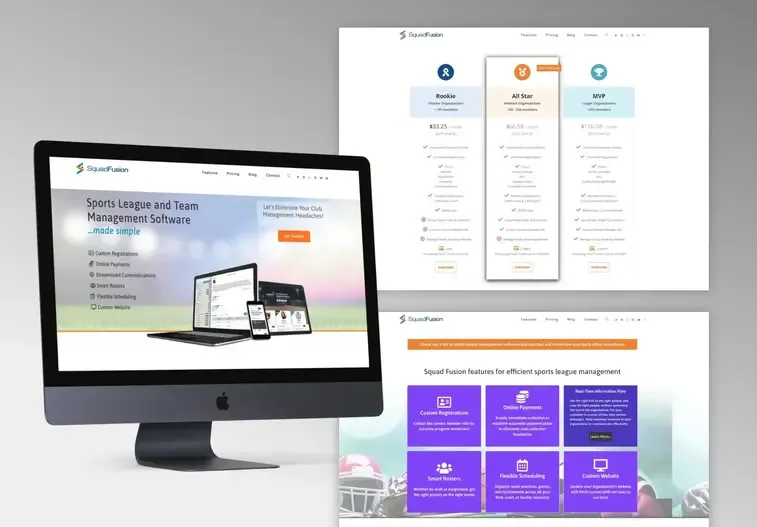
Are there existing APIs for football stats I can integrate?
Absolutely, there is no need to build specific features from scratch when you can integrate existing third-party APIs and deliver top-notch and safe services. The top proven potential integrations for a sports league management software include:
- Firebase for safe and efficient data storage;
- Supabase as a №2 option right after Firebase;
- AWS Amplify as a top all-in-one solution for your platform;
- Stripe for ensuring safe and instant payment gateways;
- Paddle as an ideal solution for tax handling;
- PayPal remains in its top position among payment integrations;
- Clerk to ensure secure and reliable authentication;
- Twilio for enabling real-time push-notifications and alerts;
How can I enable push notifications for schedule changes or team updates?
For enabling real-time push notifications and alerts in your sports management platform, you need to follow this simple step-by-step guide:
- Decide on notification types you need, like schedule changes, match alerts, training session reminders, chat messages, team announcements, etc.
- Choose API service, e.g., Firebase Cloud Messaging, ExpoNotifications, Amazon SNS, etc.
- Integrate notifications into your platform, request user permissions, generate and store device tokens for each user, and use Cloud Functions or a backend to send notifications.
- Handle user preferences to create a custom user experience.
- Monitor and iterate if needed, track opened notifications, and use A/B testing for identifying the best strategy.
What are the best practices for UX in a sports management app?
Building and designing a user-centered sport league management software means coding not for the money or top ratings, but for the users straight. And here are the top user experience practices to implement into your football team management app:
- Device Versatility for satisfying the needs of any device type fan.
- Effortless Scheduling & Messaging for creating an all-in-one user experience.
- API Integrations: calendar sync, payment gateway options, camera access, and potential educational content.
- Accessibility Prioritization: readable fonts, complementary color palette, color-blind friendliness, or language localization tell a lot about your approach.
- Customization for meeting a broad audience's needs as well as reaching diverse sports leagues positions your solution one step ahead of off-the-shelf competitors.
Mykhailo Fedorovych, a leading developer, about customization in the SquadFusion solution: "We made a big bet on customization and now it's the feature that allows our client to sell the platform to hundreds of users annually. From tailored admin and player panels to unified features meeting the demands of soccer, hockey, tennis, or any other players, our sports league management software is meant to be a robust communication and coaching tool for anyone."
How long does it take to develop such an app?
The time required to launch a sports league management software depends on several crucial factors like feature demands, tech stack choice, cooperation model, and others. However, there is a typical breakdown of time limits for developing specific solutions:
- MVP (Minimum Viable Product): from 2 to 4 months is the time it usually takes to validate your football team management app idea via an MVP.
- Mobile Football Team Management App: from 6 to 9 months to build a full-featured mobile solution from scratch.
- Web Sports League Management Platform: from 4 to 8 months to create a scalable web or cross-platform solution.
"However, the timeline of a custom project development depends on so many factors that it is almost impossible to tell for sure how exactly much time it is going to take if we don't dive deep into the details." And Mychailo seems to be absolutely correct. The final project budget and timeline are heavily affected by several vital factors such as:
- Project Complexity & Featuring: the time it takes to build a basic football team management app or a custom full-featured sports league management platform will significantly vary due to the huge gap in tech stack requirements and feature demands.
- Team Size: it is fantastic to have a hard-baked pair of web developers in-house, but we must understand that a scalable project requires at least a few niche experts or, at most, a dedicated team of experienced specialists.
- Tech Stack Choice: when you opt for scalable tech stacks or niche-specific tools, you must be ready to sacrifice development speed for the prime quality.
- API Integrations: when building a future-proof sports league management software, we usually think of at least several third-party integrations like payment gateways, calendar sync, or communication tools. All the above-mentioned features will give you a great advantage among the competitors, but will require additional investment in costs and time.
- Cooperation Model: a trusted custom development company usually provides several cooperation models to fit clients' unique needs and opportunities. These typically include the Fixed Cost to bring precision in deadlines and budget, the Dedicated Team to provide top-notch outsourced experts, and the Time & Material to let the clients pay only for the time and resources used.
Considering all of the above-mentioned aspects, you can get a realistic understanding of your sports league management software time scope.

Should I use Firebase for real-time updates and chat?
"Yes, Firebase is a pretty basic but proven choice for integrating real-time updates and chat due to its light-weight structure and scalability potential." As usual, Mykhailo shares his best thoughts on sports league management software development, but let's dive a little deeper into why Firebase is your top option:
- Scalable Infrastructure allows your solution to easily handle thousands of messages in real time.
- Cross-Platform Support eliminated the need for building separate solutions for Android, iOS, and web.
- Push-Notifications will contribute to your unmatched user experience and engage more active audience.
- Perfect for an MVP building to easily and quickly validate your idea.
- Real-Time Database ensures instant sync of messages and updates across all users.
In tracking stock, Firebase stands at the very top of our recommended options to choose when planning a real-time updates and messaging integration.
What are some successful examples of football management apps?
In 2025, digitalization has spread far beyond education or gaming, unifying them in a sports league management software. Among the top successful examples of football management apps, we highlight:
- TeamSnap: targeted mainly at young football/soccer players, provides push-notifications, game scheduling, and several subscription plans.
- SquadFusion: an all-in-one solution targeted at clubs, schools, or member-based organizations, surprises the users with robust custom tools, cross-device compatibility, and several subscription plan options.
- 360Player: coach-centered sports league management software targeted at semi-pro teams, provides video breakdowns, and real-time communication.
- SportEasy: popular in Europe, a match-planning solution with club-wide management tools and advanced data tracking.
If you want to have a fresh spark of inspiration, check out the top football team management app examples above, and do not hesitate to bring the most successful feature into your own solution.
How much does it cost to build and maintain a football team management app?
The final cost of your sports league management software development is influenced by several key factors, but there is a typical price range, such as:
- MVP with Core Features: $15,000 - $70,000+
- Full-Scale Product: $40,000 - $100,000+
- Ongoing Support: from $50 to $1000 monthly, depending on the features you would like to maintain or scale.
Even though we have an estimated price range, you should always consider a few paramount aspects that will directly influence your sports league management software development cost, like:
- Outsourcing Destination: when opting for software development outsourcing, you face an extensive price tag gap on the market, which may take a while to discover, but that is the first thing we consider when forming the final project budget. Building a football team management app with a small dedicated team from India, developing a custom sports league management software with experts from Eastern Europe, and maintaining it via American devs will sharply differ.
- Project Scope & Complexity: going back to the basics, your sports league management software's features, tech stack choice, timeline demands, and design decisions will be the groundwork of your project cost.
- Team Size: in case of developing a custom football team management app while having a limited budget, you have to choose between speed and price. For instance, having a small dedicated team of developers in-house may cost less, but an outsourced full-stack team of experts will help you bring your solution to the market in the shortest time.
Cooperating with a trusted outsourcing provider or working with proven experts in-house will help you save production costs and bring maximum value to your final sports league management application.
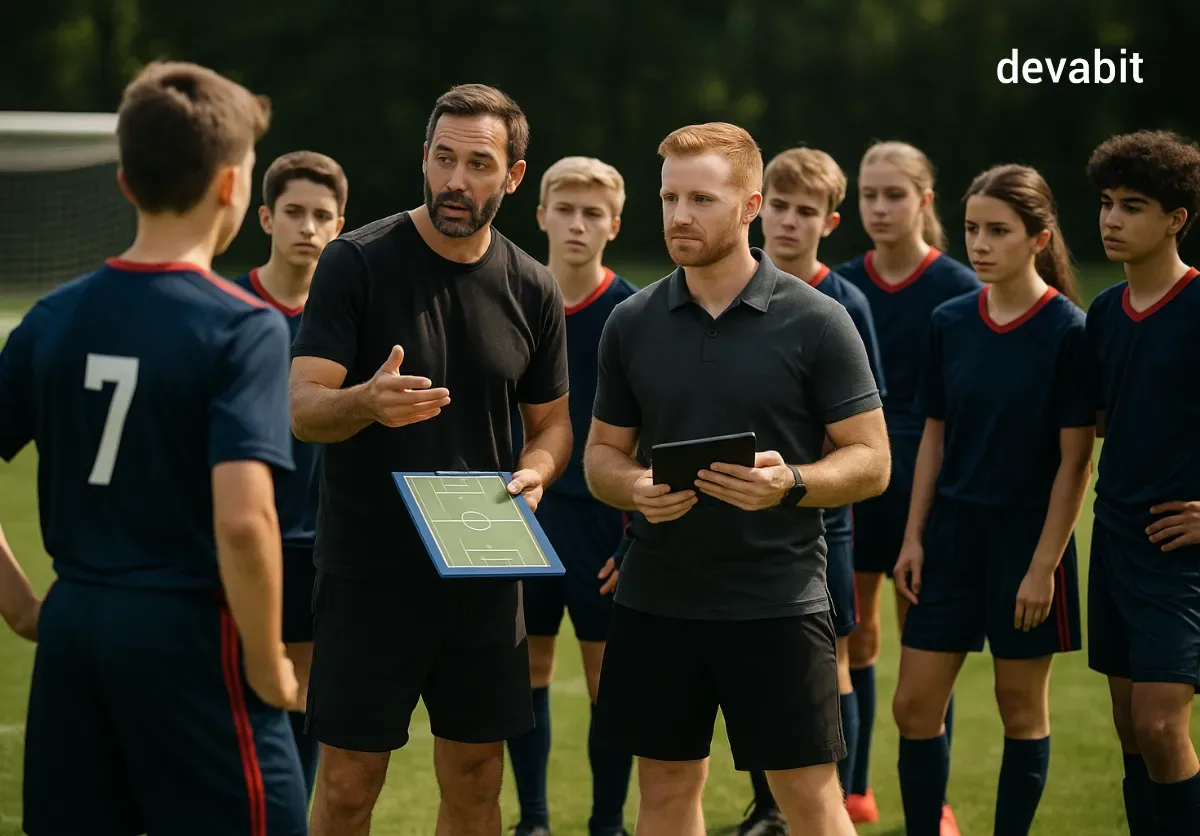
Football Team Management App: Finishing Touches
Managing a sports league used to mean spreadsheets, group chats, and a whole lot of chaos. But in 2025, it does not have to be that way. In this article, we take you behind the scenes of how a fully customizable sports league management platform was built; not just to work, but to actually make life easier for coaches, parents, and players. From real-time notifications and flexible permissions to sleek scheduling tools and smart payment systems, this platform was designed with real users in mind. Our main message is all about solving real problems via real solutions. Maybe your sports league management software will be the next solution which solves yet uncharted issues?
If you feel like you are ready to make your next moves in sports software development or if you still hesitate about your budget opportunities, devabit consulting services are designed to address the most complex challenges in the most straightforward way. Click here to discover more of our bespoke solutions or contact us today to find out more about custom web development outsourcing benefits with our leading software development company. It is only up to you to score the goal or to be forever benched!
Recent Publications
Don't miss out! Click here to stay in touch.
Discover More

Relevant Articles View all categories
View all categories CONNECT WITH US WE’RE READY
TO TALK OPPORTUNITIES
THANK YOU! WE RECEIVED YOUR MESSAGE.
Sorry
something went wrong



